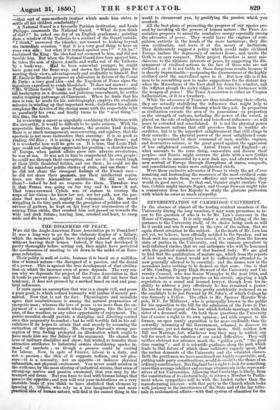THE DISARMERS OF PEACE.
pean reftitation. '
WRY did the Anglo-American Peace Association go to Frankfort?g It was a long way to go for the elaborate display of a fallacy, which the members might have. developed almost as effectively without keying their homee. Indeed, if they had developed it pretty thoroughly before setting _out., they might have perceived the needlessness of meeting to, sit down in the midst of ,an Euro- Their polity is null ab initio, . because it is based on a nullifies.- tion of helium nature—the disregard of a passion, and the denial of a. power. This is against the true development of that civiliza- tion; on which the increase even of , peace depends. The very rea- son why we deprecate the preaect of the Peace Association is, that ittends.to prevent peace; ; that even if it did not have that tendency, it does not proceed by a method based on real and prac- tical influences. ••. It restil upon an assum4tion that war, is a: simple evil, and peace a pure good, to which re ed humanity will inc • e if merely per- mitted. Now that is not the fact... Physiologb3ts and moralists agree that combativeness is among the natural propensities of energetic men ; whereas the love of peace is no more than the en- joyinent of a negative benefit when • it happens, like the love of ease, of fine weather, or any other opportunity of enjoyment. The publio moralist should provide a discipline and. directing control over this propensity to combat ; but he will terribly fail in his cal- culations If „he hopes to _attain that end merely by assuming the extinction of the propensity`.. Mr. George Damson's strong per- ception of true feeling prompted an- illastration which' ought to have made hilt' see the 'fallacy of hisrargiiment. • He shared the kid of Military discipline and show, .,but wished to transfer those attractive attributes to industrial armies shouldering spades in- stead of , muskets ; as though a passion: could be excited for labour Now, in spite of Fourier, labour is a duty, and
.
not: a', passion ; the ,idea, of it suggests tedium, . and not plea- sure-L.-it is a. necessity, not an appetite-4t induces , physical exhanstictit, mot physical excitement. Younever could awaken in the audience, by the most stirring of induatrialstrains, that sense of strunt-up, nerves and passion aWakened, that you may by the trumpet and .drum. But ytiu birve to 'deal with human beings that possess the appetite ; and you will• rest your institutions on .a very unstable basis if you think to have abolished that element by ignoring it. Others, who rely on a less imaginative and more practical idea of human nature, will find it the easiest thing in the
world to circumvent you, by gratifying the passion which you overlook.
All the best plans of promoting the progress of our species pro- ceed by invoking all the powers of human nature : the Peace As- sociation proposes to annul the combative energy especially among the advocates of peace. They would leave the engines of com- pulsion entirely in the hands of the more barbarous ; they dis- arm civilization, and leave it at the mercy of barbarism. They deliberately suggest a policy which would make civilized Europe imitate the degeneracy of ancient Rome, and invite the Goth to an easy conquest. Their project therefore is most mis- chievous to the ultimate interests of peace, by soggesting the dis- armament of civilized nations in the face of those who are not civilized ; or it is not liable to those dangerous results because it is sheerly impracticable—postponing the disarmament of the highly civilized until the uncivilized agree to it. But how idle is it for men to be assembling now to make suggestions for the distant day when the Mussulman of the East shall ay down his scimitar, an the Affghan plough the rocky ridges of his native fastnesses with the weapon of peace ! The Peace Association is either an Utopian hallucination, or it is a treachery.
While the advocates of Peace are thus misdirecting their efforts, they are actually stultifying the influences that might help to strengthen and extend the blessing which they ask. In proportion as civilization extends the area of its possessions—in proportion as the strength of nations, including the power of the sword, is placed on the side of enlightened and beneficent influences—so will peace be extended and consolidated. It is not the physical power of the foremost nations that still provokes them to warlike ab- surdities, but it is the imperfect enlightenment that still clings to their councils : the physical power of the most enlightened coun- tries, as represented in their command of men, warlike engines, and destructive science, is the great guard against the aggression of less enlightened countries. Annul France and England—or, what amounts to the same thing, emasculate and disarm their peoples—and Russia might overrun the globe with a new Gothic conquest—to be succeeded by a new dark age, and afterwards by a new revival of Europe through disruptions of states, conquests, and consolidations under more enlightened chiefs. Were these exclusive advocates of Peace to study the art of eco- nomizing and husbanding the resources of the most civilized coun- tries, so as to make them more effective and overwhelming, they would do good service. To that end, Gamier might emulate Vau- ban, Cobden might imitate Napier, and George Dawson might take a commission from her Majesty to study the glorious profession with which he owns so much sympathy.


























 Previous page
Previous page